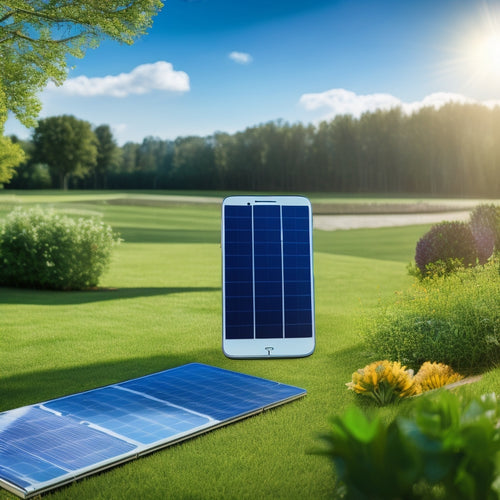
10 Earth-Friendly Tips for Solar Panel Cleaning
Share
By choosing eco-friendly cleaning solutions, like biodegradable soaps and vinegar, you're already taking a step in the right direction. Avoid harsh chemicals like bleach and ammonia, which can damage your panels and harm the environment. Gentle cleaning techniques with soft brushes and microfiber cloths will keep your panels scratch-free. Rinse with deionized water to prevent streaks, and schedule cleaning during low energy output periods. Regular debris removal and damage inspections will guarantee peak performance. By adopting these earth-friendly tips, you'll not only reduce your carbon footprint but also safeguard your investment - and there's even more to investigate when it comes to maximizing your solar panel's potential.
Key Takeaways
- Use biodegradable soaps and gentle cleaning agents like vinegar to avoid harming the environment and solar panels.
- Avoid harsh chemicals like bleach, ammonia, and phosphates that can damage panels and contaminate soil and water.
- Employ soft brushes, microfiber cloths, and gentle cleaning techniques to prevent scratching and damage to solar panels.
- Rinse solar panels with deionized water only, and dry them immediately to prevent water spots and mineral deposits.
- Schedule regular cleaning and maintenance, including debris removal and damage inspections, to ensure optimal solar panel performance and energy efficiency.
Choose Eco-Friendly Cleaning Solutions
When it comes to cleaning your solar panels, using eco-friendly cleaning solutions is crucial to assure the panels' best performance and longevity.
You want to verify that the cleaning products you use won't harm the environment or the panels themselves. Opt for biodegradable soaps that are specifically designed for cleaning solar panels. These soaps are gentle on the panels and won't leave any residue that could affect their efficiency.
Additionally, it's important to take into account the high-efficiency panels you're using, as they may require specific cleaning products to maintain their advanced photovoltaic technology.
Another effective and eco-friendly option is vinegar solutions. Mix equal parts water and white vinegar in a spray bottle, and you'll have a gentle yet effective cleaning solution.
These eco-friendly cleaning solutions will keep your solar panels clean and functioning at their best, while also doing your part for the environment.
Avoid Harmful Chemicals Completely
You'll want to steer clear of harsh chemicals when cleaning your solar panels, as they can damage the panels' surface or compromise their efficiency. These chemicals can also have a negative environmental impact, contaminating water sources and harming local wildlife. Instead, opt for chemical alternatives that are gentle on the panels and the planet.
| Chemical | Environmental Impact |
|---|---|
| Bleach | Toxic to aquatic life, contaminates soil and water |
| Ammonia | Releases harmful fumes, contributes to air pollution |
| Phosphates | Contributes to algae growth, depletes oxygen in waterways |
Use Soft Brushes and Cloths
When cleaning your solar panels, you'll want to use soft brushes and cloths that won't scratch or damage the surface.
Look for gentle cleaning agents that won't leave streaks or residue, and opt for effective brush types like microfiber or soft-bristled brushes.
Regular cleaning is essential to prevent up to 20% efficiency loss solar panel maintenance.
By doing so, you'll be able to maintain peak performance and energy output.
Gentle Cleaning Agents
Regularly, solar panels require gentle cleaning agents to maintain their efficiency and prolong their lifespan.
When it comes to cleaning your solar panels, you'll want to opt for natural alternatives that won't damage the surface or leave streaks. It's important to clean your solar panels quarterly to prevent dust from reducing energy output by up to 25% quarterly cleaning.
Additionally, using soft-bristled brushes or specialized tools can help prevent damage to the panels.
You should consider the following gentle cleaning agents for your solar panels:
- Distilled water: A simple yet effective option for cleaning solar panels, distilled water is free from minerals that can leave streaks or spots.
- Mild dish soap: A gentle dish soap can be used to clean solar panels, but make sure to rinse them thoroughly to avoid soap residue buildup.
- White vinegar: A natural and eco-friendly option, white vinegar is effective in removing dirt and grime from solar panels.
Remember to clean your solar panels at the right frequency to maintain their efficiency.
Effective Brush Types
Soft-bristled brushes and microfiber cloths are vital tools for cleaning solar panels, as they effectively remove dirt and debris without scratching the surface.
When choosing a brush, you'll want to select one with gentle brush materials that won't damage your panels. Look for brushes with soft nylon or polyester bristles, which are designed specifically for solar panel cleaning. The brush shape is also important, as a curved or angled brush can help you reach corners and edges more easily.
Furthermore, it's essential to make certain the cleaning process doesn't compromise the high-efficiency solar panels designed for fleet vehicles, which can have an efficiency rate of 19% to 22%.
Microfiber cloths are another great option, as they're gentle on the panels and can be used with or without cleaning agents.
Select Microfiber Cloths Wisely
Across the solar panel cleaning industry, microfiber cloths have emerged as a popular choice for their effectiveness in removing dirt and debris without scratching the panels.
When selecting a microfiber cloth, you should consider the following factors to guarantee you get the best results, especially since solar energy adoption contributes to sustainable practices in fleet management. This is particularly important for fleets that rely on solar panels to power auxiliary systems, reducing fuel consumption costs and emissions.
-
Microfiber benefits: Look for cloths with a high density of microfibers, as they're more effective at picking up dirt and debris.
-
Cloth durability: Choose cloths with a high thread count and durable stitching to guarantee they can withstand repeated use and cleaning.
-
Lint-free and electrostatic-free: Opt for cloths that are lint-free and electrostatic-free to prevent scratches and damage to your solar panels.
Rinse With Deionized Water Only
Once you've selected the right microfiber cloth, it's important to focus on the rinsing process.
When rinsing your solar panels, it's crucial to use deionized water only. This type of water is free from minerals and ions that can leave streaks and spots on your panels. Deionized water provides several benefits, including preventing mineral buildup and guaranteeing a spotless finish.
When rinsing, use a gentle, sweeping motion to remove any remaining dirt or debris. Avoid using high-pressure sprays or harsh rinsing techniques, as these can damage your panels. Instead, opt for a low-pressure rinse to make certain your solar panels are clean and free of streaks.
Dry Panels to Prevent Watermarks
When you're done rinsing your solar panels with deionized water, it's essential to dry them thoroughly to prevent water spot formation.
If you don't, mineral deposits can accumulate, reducing your panels' energy output.
Preventing Water Spot Formation
To guarantee ideal energy output from your solar panels, preventing water spot formation is vital. When you don't dry your panels properly after cleaning, water spots can form, reducing energy efficiency.
This is especially important in areas with high sun exposure, as it can accelerate the formation of water spots.
To prevent water spot formation, follow these tips:
-
Dry your panels immediately after cleaning to prevent water droplets from evaporating and leaving behind mineral deposits.
-
Clean your panels during the cooler part of the day to minimize evaporation and reduce the risk of water spot formation.
-
Increase your cleaning frequency during periods of high humidity or heavy rainfall to prevent water spots from forming.
Minimizing Mineral Deposits
Drying your solar panels thoroughly after cleaning is essential for minimizing mineral deposits that can lead to watermarks.
When you don't dry your panels, mineral-rich water evaporates, leaving behind unsightly streaks and spots. This mineral buildup reduces your solar panel's efficiency over time.
To prevent this, dry your panels using a lint-free cloth or squeegee after cleaning. You can also increase your cleaning frequency in areas with hard water to minimize mineral deposits.
Regular drying and cleaning will help maintain your solar panel's performance and guarantee you get the most out of your investment.
Schedule Cleaning for Optimal Times
Your solar panel's energy output depends heavily on the panels' cleanliness, and scheduling cleaning for ideal times is essential to maximize their performance.
To optimize your cleaning schedule, consider the following factors:
-
Seasonal considerations: Clean your panels during periods of low energy output, such as during winter months or periods of heavy rainfall, to minimize energy losses.
-
Weather impact: Avoid cleaning during extreme weather conditions like high winds, thunderstorms, or intense sunlight, which can damage the panels or reduce cleaning effectiveness.
-
Morning or late afternoon: Clean your panels during these times when the sun isn't directly overhead, reducing evaporation and allowing for more effective cleaning.
Remove Debris Without Scrubbing
Since dirt and debris can greatly reduce your solar panels' efficiency, removing them without scrubbing is crucial to maintain ideal performance.
When performing debris removal, use a soft-bristled brush or a leaf blower to gently sweep away loose particles. Avoid using high-pressure washes, as they can damage the panels.
For more stubborn debris, mix a solution of mild soap and water, and use a microfiber cloth to wipe down the panels. This gentle approach guarantees effective debris removal without compromising panel maintenance.
Inspect Panels for Damages Regularly
As you continue to maintain your solar panels, regular inspections for damages become essential to prevent efficiency losses and guarantee peak performance.
You'll want to catch any issues before they impact your energy output.
During your panel inspection, look for:
- Cracks or broken glass in the panels themselves
- Loose or corroded connections between panels or to the mounting system
- Signs of pest or animal infestation, such as bird nests or rodent damage
Conducting regular damage assessments will help you identify and address problems early, ensuring your solar panels operate at their best.
Consider Robot Cleaning Assistants
Two hundred hours of sunshine can deposit a considerable amount of dirt and debris on your solar panels, reducing their efficiency by up to 25%.
To lessen this impact, consider investing in robot cleaning assistants. These innovative tools can greatly enhance robot efficiency, allowing you to maintain peak energy production.
Robot cleaning assistants are designed to maneuver your solar panel system, gently removing dirt and debris without scratching the surface.
By incorporating these maintenance tips into your routine, you'll reduce the risk of damage and guarantee your panels operate at peak performance.
With robot cleaning assistants, you'll enjoy increased energy independence and a reduced carbon footprint, all while saving time and effort on maintenance.
Frequently Asked Questions
Can I Clean Solar Panels During Peak Sun Hours?
You shouldn't clean solar panels during peak sun hours, as it can cause water to evaporate too quickly, leaving streaks and mineral deposits that hinder energy efficiency, making regular solar panel maintenance and effective cleaning techniques essential.
Do I Need to Clean Solar Panels in a Specific Direction?
When cleaning solar panels, you'll want to adopt efficient cleaning techniques that avoid scratching or damaging the surface. For ideal maintenance, you should clean in a specific direction, usually from top to bottom, to prevent dirt and debris from spreading.
How Often Should I Inspect Solar Panels for Damage?
While freedom from worry is what you crave, regular solar panel maintenance is key; you should inspect them every 6-12 months for damage, as a proactive damage assessment guarantees peak energy harvesting and prolongs their lifespan.
Can I Use a Pressure Washer for Solar Panel Cleaning?
When cleaning solar panels, you shouldn't use a pressure washer, as it can damage the panels' surface; instead, take safety precautions and opt for a soft-bristle brush or microfiber cloth with gentle cleaning solutions to guarantee efficient and safe cleaning.
Are There Any Local Regulations for Solar Panel Cleaning?
You'll need to check with your local government to determine if there are specific regulations governing solar panel cleaning in your area, as local guidelines and safety protocols may vary, ensuring you're compliant and operating freely.
Related Posts
-

Why Biodegradable Dish Soap Matters for Earth-Conscious Homes
You likely don't realize that the dish soap you're using today will still be harming the environment long after you'v...
-

7 Best Solar Panel Upkeep Apps for Homeowners
You can optimize your solar panel's energy output and efficiency by up to 20% with regular maintenance, which is wher...
-

What Water-Saving Gardens Complement Electric Vehicle Ownership?
As you pair your electric vehicle with a water-saving garden, you're not only reducing your carbon footprint but also...


